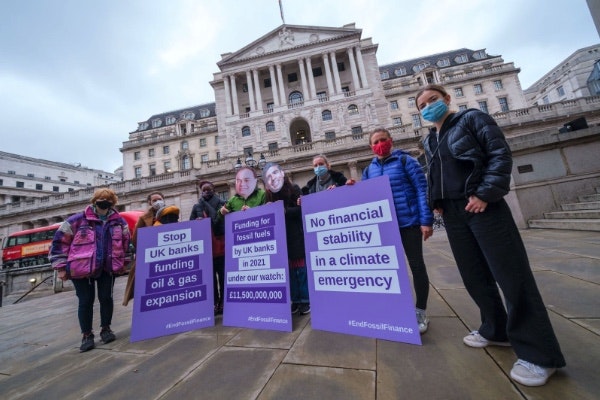Consequences of the current money system

[vc_row][vc_column][vc_column_text]The current monetary system results in a wide array of negative social, environmental and economic consequences: high house prices, high public and private debts, inequality, the environment, and democracy, periodic booms & busts, and occasionally financial crises, depressions and even debt deflations, as well as serious consequences for growth, unemployment, investment.
Here we look at the effect of the monetary system on debt, house prices, inequality, the environment, the level of democracy, recessions & crises, jobs & businesses and taxes & public spending:[/vc_column_text][/vc_column][/vc_row][vc_row][vc_column width=”1/1″][vc_row_inner][vc_column_inner width=”1/4″][vc_single_image img_link_target=”_self” img_size=”215×215″ img_link=”http://bsd.wpenginepowered.com/issues/debt/” image=”23222″][/vc_column_inner][vc_column_inner width=”3/4″][vc_column_text]Debt
Most of money in the UK is created by banks when they make loans. The only way to get extra money into the economy is to borrow it from banks, leaving us all trapped under a mountain of personal debt and mortgages. Read more[/vc_column_text][/vc_column_inner][/vc_row_inner][/vc_column][/vc_row][vc_row][vc_column width=”1/1″][vc_row_inner][vc_column_inner width=”1/4″][vc_single_image img_link_target=”_self” img_size=”215×215″ img_link=”http://bsd.wpenginepowered.com/issues/house-prices/” image=”23223″][/vc_column_inner][vc_column_inner width=”3/4″][vc_column_text]House prices
Many of us were told that house prices are so high because there are too many people and not enough houses. While this is true, house prices have also been pushed up by the hundreds of billions of pounds of new money that banks created in the years before the financial crisis. Read more[/vc_column_text][/vc_column_inner][/vc_row_inner][/vc_column][/vc_row][vc_row][vc_column width=”1/1″][vc_row_inner][vc_column_inner width=”1/4″][vc_single_image img_link_target=”_blank” img_size=”215×215″ img_link=”http://bsd.wpenginepowered.com/issues/inequality/” image=”23224″][/vc_column_inner][vc_column_inner width=”3/4″][vc_column_text]Inequality
The fact that our money is issued as debt means that the level of debt must be higher than it otherwise would be. The interest that must be paid on this debt results in a transfer of wealth from the bottom 90% of the population (by income) to the top 10%, exacerbating inequality. Read more[/vc_column_text][/vc_column_inner][/vc_row_inner][/vc_column][/vc_row][vc_row][vc_column width=”1/1″][vc_row_inner][vc_column_inner width=”1/4″][vc_single_image img_link_target=”_self” img_size=”215×215″ img_link=”http://bsd.wpenginepowered.com/issues/environment/” image=”23225″][/vc_column_inner][vc_column_inner width=”3/4″][vc_column_text]Environment
How the current economic system contributes to environmental destruction and accelerated resource consumption is not straightforward, and we don’t claim to have all the answers, but there are some observations we want to make. Read more[/vc_column_text][/vc_column_inner][/vc_row_inner][/vc_column][/vc_row][vc_row][vc_column width=”1/4″][vc_single_image img_link_target=”_self” img_size=”215×215″ img_link=”http://bsd.wpenginepowered.com/issues/democracy/” image=”23226″][/vc_column][vc_column width=”3/4″][vc_column_text]Democracy
While all the TV news cameras point at politicians in Westminster, the power to create money gives the banking sector more power than government. Here’s why it’s undemocratic to allow banks to create the nation’s money: Read more[/vc_column_text][/vc_column][/vc_row][vc_row][vc_column width=”1/4″][vc_single_image img_link_target=”_self” img_size=”215×215″ img_link=”http://bsd.wpenginepowered.com/issues/recessions-crisis/” image=”23227″][/vc_column][vc_column width=”3/4″][vc_column_text]Financial Crisis & Recessions
The financial crisis happened because banks were able to create too much money, too quickly, and used it to push up house prices and speculate on financial markets. Every time a bank makes a loan, new money is created. In the run up to the financial crisis, banks created huge sums of new money by making loans. Read more[/vc_column_text][/vc_column][/vc_row][vc_row][vc_column width=”1/1″][vc_row_inner][vc_column_inner width=”1/4″][vc_single_image img_link_target=”_self” img_size=”215×215″ img_link=”http://bsd.wpenginepowered.com/issues/jobs-business/” image=”23228″][/vc_column_inner][vc_column_inner width=”3/4″][vc_column_text]Jobs & Business
If banks create enough new money and pump it into the economy through personal loans and credit cards it can cause a ‘boom’ that creates jobs and encourages businesses to expand. But because these booms are fuelled by increasing personal debt rather than increase in income, sooner or later they have to end, and when they do a recession occurs that makes businesses bankrupt and people lose their jobs. The current money system is bad for business and jobs. Read more[/vc_column_text][/vc_column_inner][/vc_row_inner][/vc_column][/vc_row][vc_row][vc_column width=”1/1″][vc_row_inner][vc_column_inner width=”1/4″][vc_single_image img_link_target=”_self” img_link=”http://bsd.wpenginepowered.com/issues/taxes/” img_size=”215×215″ image=”23229″][/vc_column_inner][vc_column_inner width=”3/4″][vc_column_text]Taxes & Public Spending
When banks are allowed to create a nation’s money supply, we all end up paying higher taxes. This is because the proceeds from creating new money go to the banks rather than the taxpayer, and because taxpayers end up paying the cost of financial crises caused by the banks. Read more[/vc_column_text][/vc_column_inner][/vc_row_inner][vc_separator][/vc_column][/vc_row]